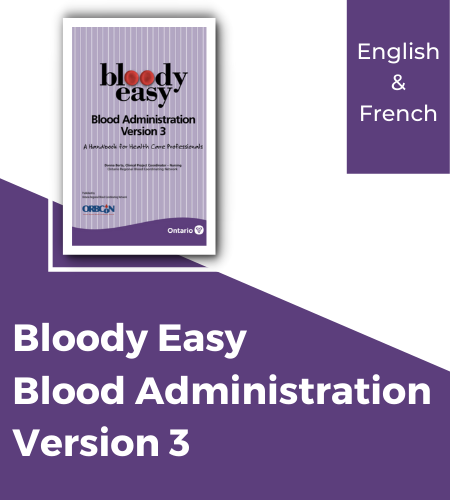Checking in on Immunoglobulin Utilization Practices at Ontario Hospitals
Wendy Owens, Rebecca Barty, Laurie MacLeod, Alison Wendt, Ontario Regional Blood Coordinating Network (ORBCoN)
During the summer months of 2020, following the onset of the COVID-19 pandemic, concerns were raised regarding the ongoing supply of Intravenous Immune Globulin (IVIG) due to decreased plasma collections in the United States. Because Canada is not self-sufficient in collections of plasma to produce Immune Globulin (IG) products, it leaves us more vulnerable to fluctuations in the global market. As a result of these concerns, the National Advisory Committee on Blood and Blood Products drafted an Interim National Plan to help prepare for a possible disruption in the supply of Immunoglobulins.1
In December 2020 the Auditor General’s Office released the results of a value for money audit on the blood system in Ontario.2 Thirteen recommendations were made. Three of them related to utilization of immunoglobulins. It was recommended that the Ministry of Health:
- collect more complete data from hospitals on how immunoglobulins are being used
- eliminate use outside of guidelines
- monitor Ontario hospital’s adoption of the provincial Immunoglobulin Utilization Guidelines
- identify alternatives for immunoglobulins
- prepare for the event of limited supply of immunoglobulins and protect Ontarians who rely on these products to live
In response to these audit recommendations, and in light of increased supply pressure due to the COVID-19 pandemic, ORBCoN worked with hospital colleagues to develop two surveys to gather information on hospital compliance with the Ontario IG Utilization Strategy as well as awareness and preparedness of a potential supply disruption. In this article, we will share some of the preliminary findings from these surveys.
The first survey was issued to 370 hospital contacts in transfusion service laboratories to ask their perspective on receiving and reviewing orders for immunoglobulin. The second survey was issued to 180 physicians that request immunoglobulin.
We received 109 responses to the first survey (representing 148 hospital sites). Responses were received from small (40.4%), community (45.9%) and teaching (13.8%) hospitals. Five respondents indicated they do not issue immunoglobulin.
The majority of respondents to the transfusion service survey were supervisors or managers and some provided responses for multiple sites.
Thirty-nine responses were received from the second survey issued to 180 prescribing physicians (representing 16 large community and teaching hospital sites). All regions of the province were represented. All of the physicians responding to the prescriber survey confirmed they order IVIG for their patients. The following specialties were represented:
– Hematology
– Internal Medicine
– Neurology
– Rheumatology
– Oncology
– Immunology
– Infectious Diseases
– Pediatrics
– Critical Care
A summary of results from the two surveys appears in Table 1 below:
| Survey 1 – Transfusion Service Laboratories (issued July 2021) | |
| Aware of potential IVIG supply disruption | 98.1% (102/104) |
| Believe clinicians who request IVIG are aware of a supply concern | 60.6% (63/104) |
| Are aware of the National Plan for Management of Shortages of Immunoglobulin Products | 90.4% (94/104) |
| Have reviewed the National Plan for Management of Shortages of Immunoglobulin Products | 74.5% (70/94) |
| Require physicians to submit an MOH IG order request form | 92.3% (96/104) |
| Review MOH IG order request form to ensure request conforms to Ontario IVIG Guidelines | 91.3% (95/104) |
| Require requesting physician to provide justification if indication is outside of Guidelines | 80.8% (84/104) |
| Potential IVIG supply disruption was discussed at Hospital Transfusion Committee meeting | 70.2% (73/104) |
| Have developed a hospital plan to manage shortages of IVIG | 20.2% (21/104) |
| Hospital plan to manage shortages of IVIG is in development | 30.8% (32/104) |
Survey 2 – Physicians who prescribe Immunoglobulins (issued September 2021) | |
| Aware of potential disruption in supply of IVIG | 79.5% (31/39) |
| Aware that should a shortage occur there may not be sufficient product to meet all patient’s needs | 74.4% (29/39) |
| Are aware of the National Plan for Management of Shortages of Immunoglobulin Products | 51.3% (20/39) |
| Have reviewed the National Plan for Management of Shortages of Immunoglobulin Products | 65.0% (13/20) |
| Submit the Ontario IG Request Form as directed in the Ontario IG Utilization Strategy | 97.4% (38/39) |
| Follow Ontario IG Utilization Guidelines | 97.4% (37/39) |
| Use the Dose Calculator to determine patient dose (all adults) | 94.9% (37/39) |
| There are viable alternative therapies for the conditions I prescribe IVIG for | 33.3% (13/39) |
| Consider all IVIG products provided from Canadian Blood Services interchangeable | 76.9%* (30/39) |
| For patients you treat with a chronic condition, would you consider transitioning your patient to Subcutaneous IG if there is a shortage of the intravenous product? | 87.5%** (28/32) |
*reasons cited included variability in IgA levels, adverse reaction rates, patient tolerance
**some physicians treat only patients where use of Subcutaneous IG would not be indicated
Conclusion:
Of those that provided responses to these two surveys, the majority of transfusion medicine laboratory personnel that issue immunoglobulin products and physicians who prescribe them were aware of the possibility that a supply shortage of IVIG exists. Both laboratory personnel and prescribing physicians responding to the surveys indicated that a very high percentage are following the Provincial IG Utilization Strategy, ensuring requests for IG comply with the Provincial Guidelines.
While the majority of laboratory personnel consider all brands of IVIG to be interchangeable, only about three quarters of prescribing physicians agreed.
A high percentage of laboratory personnel reported they were aware of the National Plan for the Management of Shortages of Immunoglobulins however only about half of prescribing physicians that responded to the survey were aware of the National Plan. Current communication strategies to share information regarding supply constraints for this product should be reviewed to determine if there is a more effective way to ensure that the physicians who prescribe this product are better engaged. A full report of both of these surveys will be released.
References:
1. National Advisory Committee on Blood and Blood Products. The National Plan for Management of Shortages of Immunoglobulin Products (Ig) – Interim Guidance. 2021-07-27. https://www.nacblood.ca/resources/shortages-plan/The%20National%20Plan%20for%20Management%20of%20Shortages%20of%20Immunoglobulin%20Products%20(Ig)%20%20Interim%20Guidance_July%2027%202020.Published.pdf
2. Office of the Auditor General of Ontario. Value-for-Money-Audit. Blood Management and Safety. 2020-12-07. https://www.auditor.on.ca/en/content/annualreports/arbyyear/ar2020.html


University of Toronto Transfusion Medicine Rounds
November 25th, 2021 @ 12:00 pm – 1:00 pm
Use of plasma and platelets prior to interventional radiology procedures (SIR guidelines) presented by Dr. Alexandre Menard